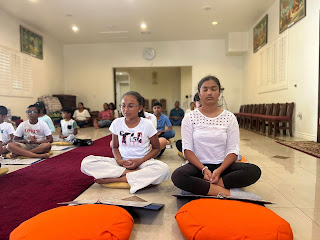Ānapānasati Bhāvanā (Meditation on Mindfulness of Breathing)
Anapanasati Bhavana, or mindfulness of breathing, is a profound practice taught by the Buddha. It's a method that brings us closer to understanding the nature of our mind and the path to liberation.
The practice of Anapanasati begins with the simple act of observing the breath. As we sit in meditation, we focus our attention on the natural rhythm of inhalation and exhalation. The breath becomes our anchor, a point of concentration that allows us to develop mindfulness.
In the initial stages, we become aware of the breath entering and leaving the body. We notice its qualities - whether it's long or short, deep or shallow, smooth or erratic. This attentiveness to the breath cultivates a heightened sense of awareness and presence in the moment.
Anapanasati is not merely about breathing; it's about cultivating mindfulness in every aspect of our experience. As we progress in this practice, we start to observe the impermanent nature of the breath and, by extension, the impermanence of all phenomena. We learn to let go of attachments, understanding that everything is in a constant state of flux.
The next phase involves calming the breath and the mind. As we breathe in and out, we allow ourselves to relax, to let go of the mental chatter and distractions. This tranquil state helps us develop a deep sense of inner peace and clarity.
Through continued practice, Anapanasati leads us to deeper insights. We start to observe the interconnectedness of body and mind. We notice how our thoughts, emotions, and bodily sensations are intertwined with the breath. This realization fosters a profound understanding of the mind-body relationship and how it influences our experiences.
As mindfulness strengthens, we move towards the exploration of the mind itself. We observe the arising and passing away of thoughts, feelings, and mental states without getting entangled in them. This detachment allows us to break free from habitual patterns, reducing suffering caused by attachment and aversion.
Ultimately, Anapanasati Bhavana leads us to the development of wisdom and insight. By observing the impermanent, unsatisfactory, and selfless nature of all phenomena, we gain a deeper understanding of reality as it is. This wisdom paves the way to liberation from suffering - the ultimate goal of the Buddha's teachings.
In our daily lives, the practice of Anapanasati Bhavana is not confined to formal meditation sessions. We can apply mindfulness of breathing in every moment - while walking, working, or interacting with others. It becomes a way of living, a constant reminder to be present, aware, and compassionate in all circumstances.
May the practice of Anapanasati Bhavana guide us towards inner peace, wisdom, and liberation from suffering. As we continue on this path, may we cultivate mindfulness and compassion not only for ourselves but for all beings.
Remember, the breath is always available to us as an anchor in the present moment. Let's embrace it with gratitude and dedication on our journey towards awakening.







%20(1).png)












































